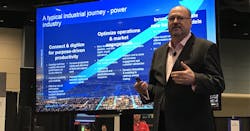GE Digital CEO: Manufacturing's Digital Transformation Depends on the Big Picture
Back in 2016, the World Economic Forum estimated that the digital transformation of the industrial world would have a $6.8 trillion impact on the economy—more that the entire consumer internet, said Bill Ruh, CEO of GE Digital. And the WEF predicted that transformation would probably start with the idea of asset performance, and that would be a $700 billion opportunity.
Speaking to attendees at IndustryWeek Manufacturing & Technology Conference & Expo on Tuesday, Ruh argued that the real transformation is starting to happen, and at a higher level of discourse than some anticipated. The WEF study thought small markers like better down time and higher efficiency of equipment would be the currency of the industrial internet. But manufacturing leaders, Ruh believes, are more interested in the bigger picture.
“In the C-Suite, they care about mastery of operations performance,” he said. “In other words, ‘across a multitude of machines and people, can I take that and really optimize a much broader process?’"
Ruh said the 500 or so manufacturing executives he meets with each year tend to look at technology as a way to innovate, recast their business models and broaden their reach--just as automakers are beginning to recast themselves as car manufacturers that are also in the data, ridesharing and artificial intelligence businesses.“They want to talk about business innovation, and that this is going to lead to a change in business."
Ruh, who joined GE in 2011, is responsible for the company’s global Informational Technology, as well as creating its digital thread. He shared further observations on the digital landscape:
- Automotive is the next frontier for digital transformation, he predicts. Manufacturing will also be digitally transformed; but at a slower, steadier pace like the thoughtful, practical people who drive it.
- For automotive, "it’s not electrification that’s the change; it’s autonomous driving software and sensors that are going to foundationally change who buys who sells, who manufactures automotive.”
- Emerging markets may be the fastest for the digital transformation. “They want to leapfrog. It’s like you see with the telecommunications market when certain countries went beyond landlines straight to mobile infrastructures
- People won’t go away in the digitalization process, but they need to be integrated in. “We’re moving from people telling machines what to do, to machines telling people what to do.”
About the Author

Laura Putre
Senior Editor, IndustryWeek
As senior editor, Laura Putre works with IndustryWeek's editorial contributors and reports on leadership and the automotive industry as they relate to manufacturing. She joined IndustryWeek in 2015 as a staff writer covering workforce issues.
Prior to IndustryWeek, Laura reported on the healthcare industry and covered local news. She was the editor of the Chicago Journal and a staff writer for Cleveland Scene. Her national bylines include The Guardian, Slate, Pacific-Standard and The Root.
Laura was a National Press Foundation fellow in 2022.
Got a story idea? Reach out to Laura at [email protected]
